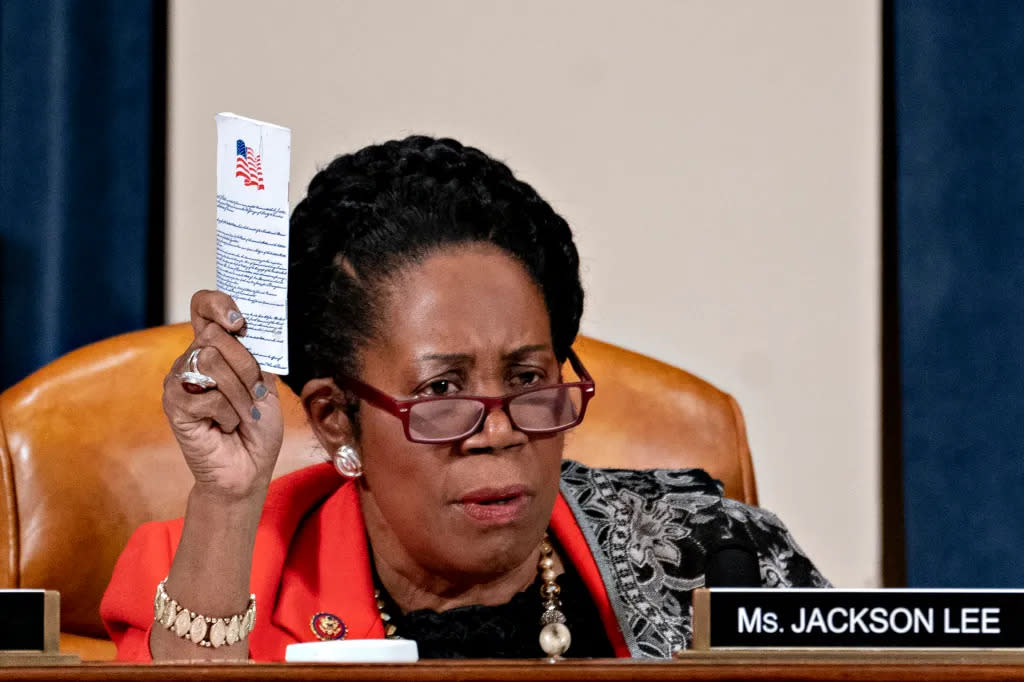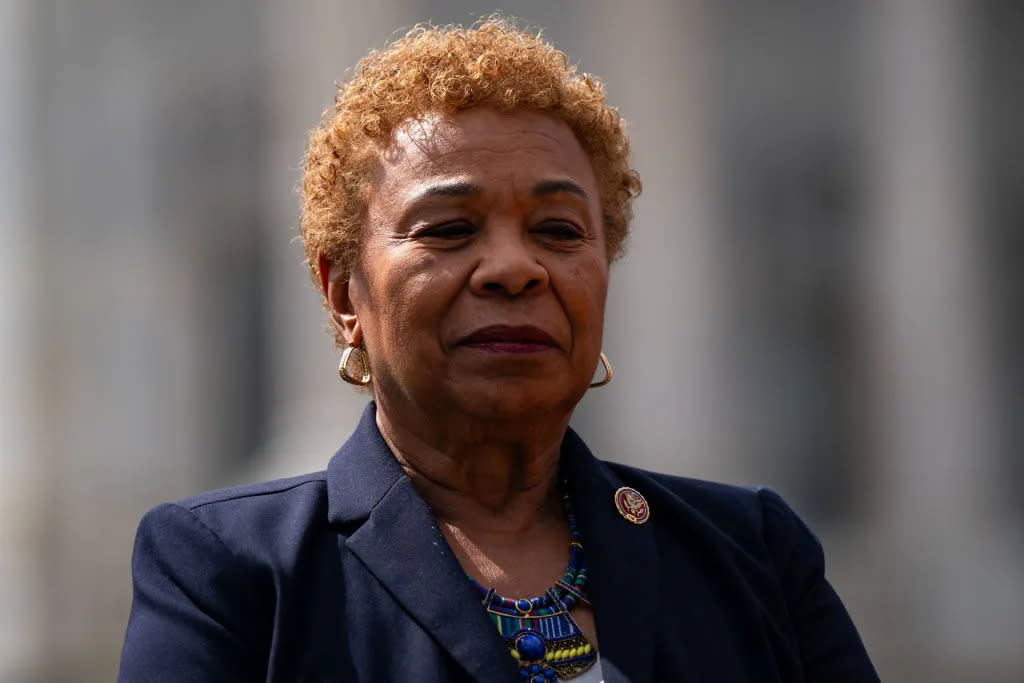‘This can be his legacy’: Advocates call for Biden to create reparations commission in final months
TheGrio exclusively reports that White House officials met with racial justice activists this week in a last-ditch effort to create a pair of commissions before Biden leaves office.
Racial justice advocates are frustrated yet hopeful after meeting with White House officials earlier this week in an attempt to compel President Joe Biden, in his final months in office, to take executive actions on creating a pair of U.S. commissions on reparations and racial healing.
The Monday meeting was hosted by the White House Domestic Policy Council after U.S. Rep. Barbara Lee, D-Calif., requested that officials meet with leading racial justice activists who have worked closely with Congressional Black Caucus members to draft several pieces of reparative legislation for Black Americans.
Leading activists who attended the meeting included professor and author Dr. Marcus Anthony Hunter; Dr. David J. Johns, CEO and executive director of National Black Justice Coalition; Dreisen Heath, founder of Why We Can’t Wait National Reparations Coalition; and Willie “Prophet” Stiggers, CEO and president of Black Music Action Coalition.
Though the Biden administration has not changed its long-held position that any reparative justice commission should happen legislatively through Congress, activists are looking for momentum in Biden’s final months in office.
“Joe Biden is leaving after 50 years of service. This can be his legacy,” Hunter told theGrio.
With less than five months left to Biden’s presidency, the African-American studies professor said the 81-year-old president could take advantage of the “legacy space” that is happening in Washington, particularly following the death of Rep. Sheila Jackson Lee, D-Texas, who died last month from pancreatic cancer.
Every session of Congress, Jackson Lee sponsored and introduced H.R. 40, a bill that would create a U.S. commission to study the impacts of U.S. slavery and reparative measures for African-Americans. To date, the bill has never made it to a floor vote.
The late congresswoman carried on the tradition from Rep. John Conyers, D-Mich, who first introduced H.R. 40 in 1989.

“[Sheila Jackson Lee] has passed on. This was her legacy. John Conyers has passed on. This was his legacy,” said Hunter. He said of Biden, “Are we interested in legacy building, which is different from lame ducking?”
Hunter notably helped draft a House resolution introduced by Rep. Lee that would establish a separate U.S. Commission on Truth, Racial Healing, and Transformation. The author of “Radical Reparations: Healing the Soul of a Nation” said he walked away from Monday’s White House meeting feeling hopeful, noting that it took multiple letters from members of Congress and activists to get meetings with Biden officials.
“I can’t help but be optimistic that the meetings themselves represent a window of opportunity,” he told theGrio.
Hunter said the meeting was longer than previous meetings, and he “got the sense” that Domestic Policy Council representatives would have “given us more time.”
Despite the White House’s support for creating a U.S. commission on reparations, officials have repeatedly argued that it should happen legislatively through Congress. But after 35 years of H.R. 40 failing to make it out of committee and onto the House floor for a vote, activists have called for Biden to take action through executive authority.
On Monday, the activists tried to convince the White House otherwise, arguing that the commission on reparations could be a useful tool.
“That’s not something you want Congress to do for you. You want to have it for yourself as arsenal where you can pull together experts and scholars and lawyers and all of those things,” Hunter maintained. “You can convene them and say, here’s what we’re up against. Help us think through this.”
“That seemed to be a different framing than they had received before,” he added. “We saw them writing down and taking notes that hadn’t necessarily happened before.”
Heath, who also attended the meeting, described the conversation as “good” but expressed frustration with the state of play.
“There may be openings to continue to work together, but then there’s been no solidified action moving forward,” she told theGrio.
Heath expressed being particularly disheartened considering that the group of the reparative justice movement’s biggest allies in Congress will no longer be in office next year. In addition to Jackson Lee’s death, Rep. Lee declined to run for reelection in order to run in a U.S. Senate race she lost in March.

Their other two allies, Reps. Jamaal Bowman, D-N.Y., and Cori Bush, D-Mo., were defeated in expensive primary races this election cycle in a clash with the pro-Israel group, American Israel Public Affairs Committee, also known as AIPAC. The movement’s only other champion, U.S. Sen. Cory Booker, D-N.J., remains in office.
“With the congressional champions displaced from these leadership positions within Congress, what is the White House going to do to step in and make this a reality?” asked Heath.
Hunter said the loss of Lee (the late Rep. Sheila Jackson Lee), Bowman, and Bush was a “major blow” to the coalition. However, he hopes their legislative portfolios will be picked up by other progressive Black members like Reps. Jasmine Crockett, D-Texas, Summer Lee, D-Pa., and Ayanna Pressley, D-Mass., and potentially Lateefah Simon, who is running to replace Lee in California’s 12th Congressional District.
“At least as we move forward, we do have a gang of like five young Black women in Congress who have the passion and the stamina to keep this going,” said Hunter.
Heath said Biden is “essentially untethered” as a sitting president and therefore empowered to use his executive powers to finally make good on his promise to seek reparative justice for Black Americans.
The activists point to President Biden’s recent unveiling of reforms for the U.S. Supreme Court as evidence of having the political will to take executive action. Biden’s “bold plan,” as described by the White House, contained proposals outlined in reports conducted by a similar commission on court reforms.
The activists believe there is more momentum on the state and local level to support policies based on racial healing and reparations than Supreme Court reforms.
“It’s more of a New Yorker intelligentsia line. That isn’t what the people have been talking about. That’s not what 43 cities are doing. That’s not what three states are doing,” said Hunter, referencing reparation commissions that have been established in California, New York and Illinois.
When asked about Monday’s meeting, White House press secretary Karine Jean-Pierre told theGrio she would not “read out any private meetings” but reiterated the administration’s stance that “Congress has the power to study reparations” and the “continuing impact” of slavery.”
“President Biden is actively delivering for the … Black community,” added Jean-Pierre, who noted the administration’s equity policies.
“Some communities have been left out, we don’t want to see that,” she told theGrio. “And we have seen some historic wealth gains … for the Black community. That’s because of the actions that this administration has taken.”
However, Heath pushed back against the administration’s habit of pointing to its equity work. While she applauds them, she argues they are “not the process of reparation that ultimately needs not only to compensate and provide resources for Black people … but also that needs to transform the actual fabric of this country.”
She added, “If those policies were enough, we wouldn’t even be having these conversations right now.”
Recommended Stories
Jordan Chiles loses appeal, will have to give up bronze medal
DIY or hire a pro? We asked 3 Black wedding experts if you should hire a planner
The Foreign Exchange’s ‘Connected’ is 20 years old. It set a blueprint for my own life
Sheryl Lee Ralph reveals ‘Abbott Elementary’ kids who play her students think she’s ‘their teacher’
Isaac Hayes’ family files lawsuit against Trump campaign for using song at rallies





